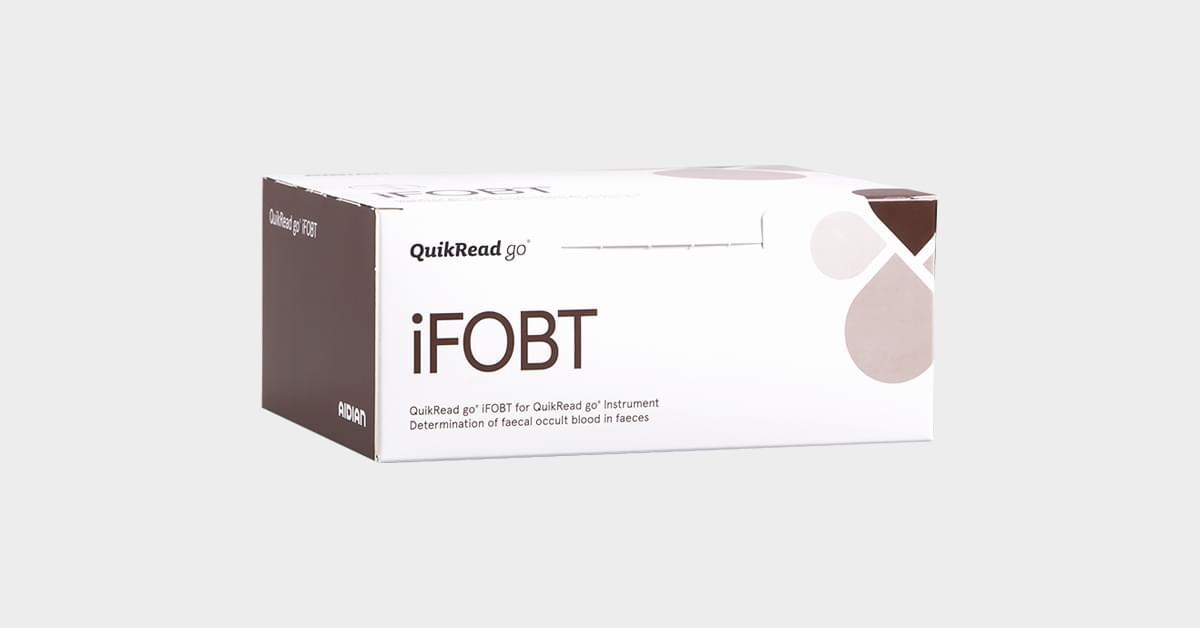QuikRead go® iFOBT is a quantitative feacal test for detecting excess gastrointestinal bleeding
The development of colorectal cancer (CRC) is slow, and many people do not experience symptoms in the early stages of CRC. However, polyps, adenomas, and CRC tumors cause bleeding in the lower gastrointestinal tract. This bleeding is invisible by naked eye in the stool, but the hemoglobin (Hb) of the faecal occult blood can be detected with a faecal immunochemical test (FIT), such as Aidian's QuikRead go iFOBT.
The hemoglobin concentrations in feacal samples are generally higher in men than women and increase by age1. FIT result levels also correlate with the cancer severity2. In symptomatic patients, QuikRead go iFOBT provides quantitative information on excessive bleeding and aids in triaging patients for further investigations, such as colonoscopy. On the other hand, negative QuikRead go iFOBT results may reduce unnecessary colonoscopies and thus healthcare costs.3 In point of care, QuikRead go iFOBT allows immediate test results that can be used for faster decision making and improved risk-stratification of the patients.
Council of the European Union recommendation is to strengthen CRC prevention through early detection. Quantitative faecal immunochemical testing is considered the preferred screening test for referring individuals for follow-up colonoscopy between 50 and 74 years old. Quantitative information from FIT results might be used on the basis of further research with a view to implement risk-tailored strategies, introducing thresholds defined per sex, age and earlier test results.4

Aidian offers feacal immunochemical test, QuikRead go iFOBT, for the detection of excess blood in feacal samples. With quantitative results and high reliability, QuikRead go iFOBT is an important part of QuikRead go family. It is a ready-to-use kit and there is no need for manual calibration of the test. Test results are shown in two minutes and automatically stored in the instrument’s memory. QuikRead go Instrument's connectivity helps to handle the data. QuikRead go iFOBT also has a handy and hygienic sampling vial, which regulates the quantity of the sample and makes the sampling procedure easy.
Faecal occult blood testing using QuikRead go iFOBT is easy to fit into the daily routines of laboratories and into the point of care testing. The quantitative measurement range for Hb in feacal samples is 10-200 µg/g or 50-1000 ng/ml depending which units laboratory prefers.
Learn more about QuikRead go iFOBT and contact us for further information.
References
- McDonald PJ et al. Faecal hemoglobin concentration by gender and age; implications for population – based screening for colorectal cancer. Clin Chem Lab Med. 2012; 50:935-40.
- Navarro M et al. Fecal hemoglobin concentration, a good predictor of risk of advanced colorectal neoplasia in symptomatic and asymptomatic Patients. Front Med (Lausanne) 2019; 6:31.
- Mclean W et al. Diagnostic accuracy of point of care faecal immunochemical testing using a portable high-speed quantitative analyser for diagnosis in 2-week wait patients. Colorectal Disease 2021; 00:1–11.
- Federation of European Academies of Medicine. Statement on the Council cancer screening recommendations | FEAM, accessed 10.3.2023.


